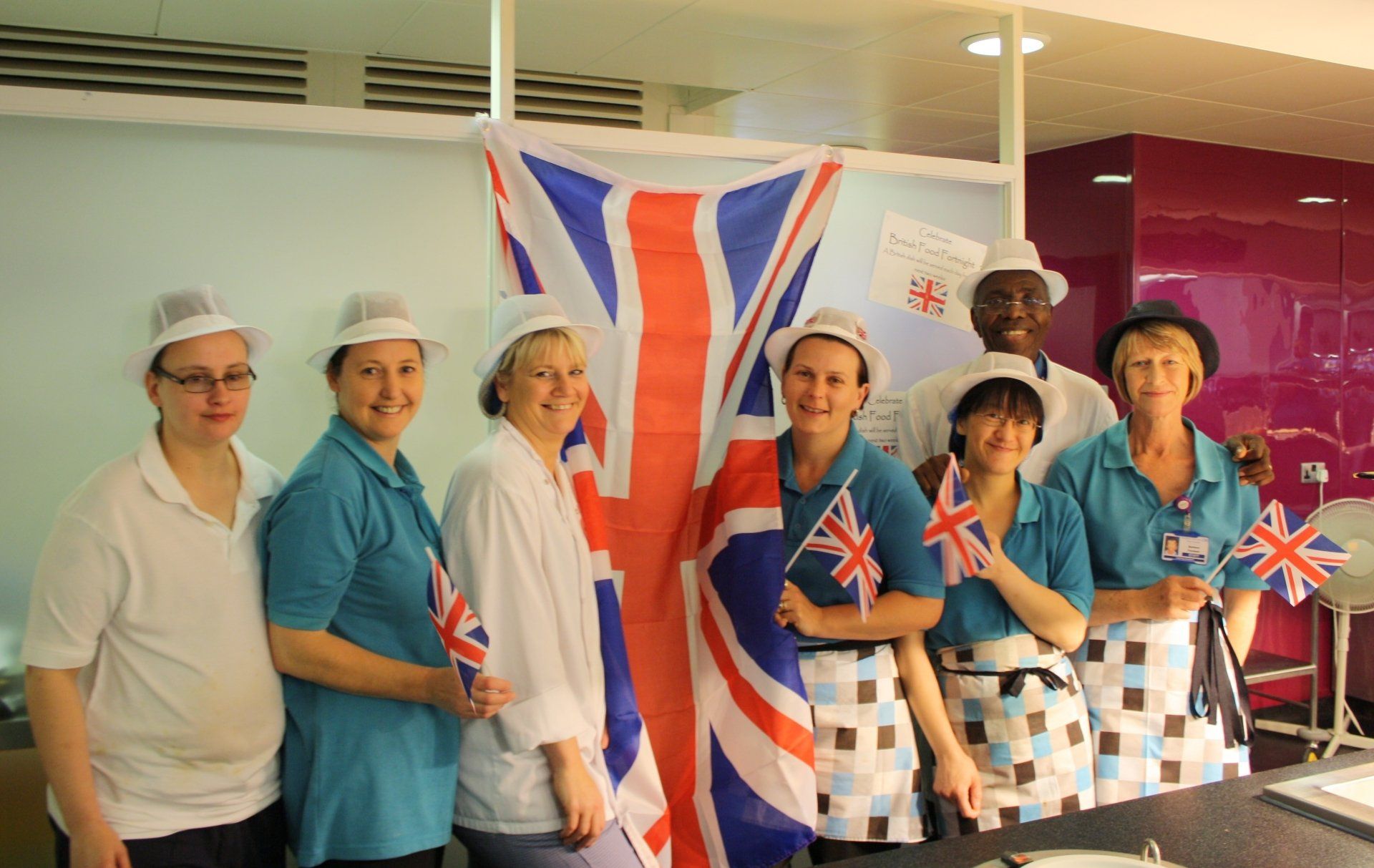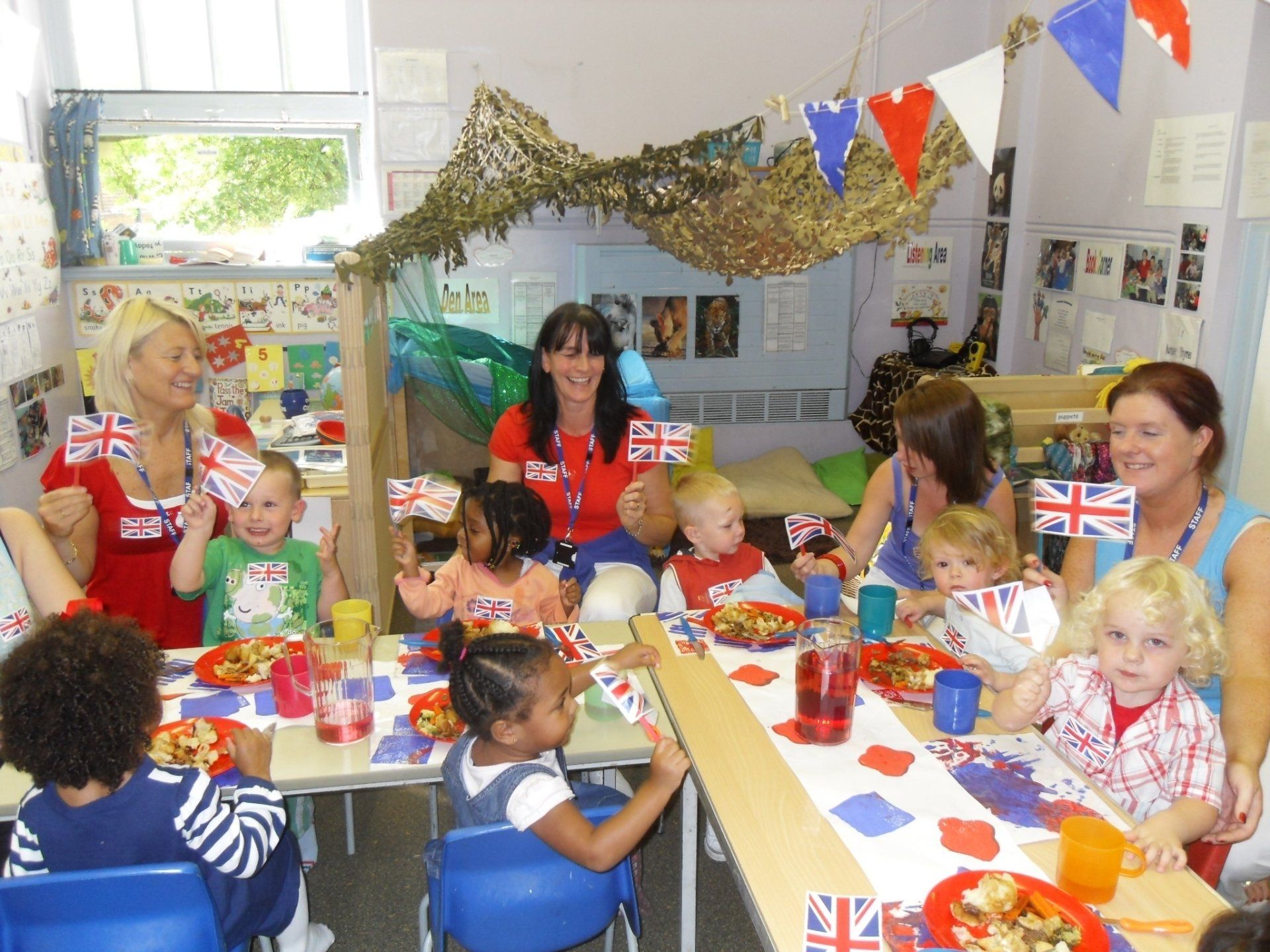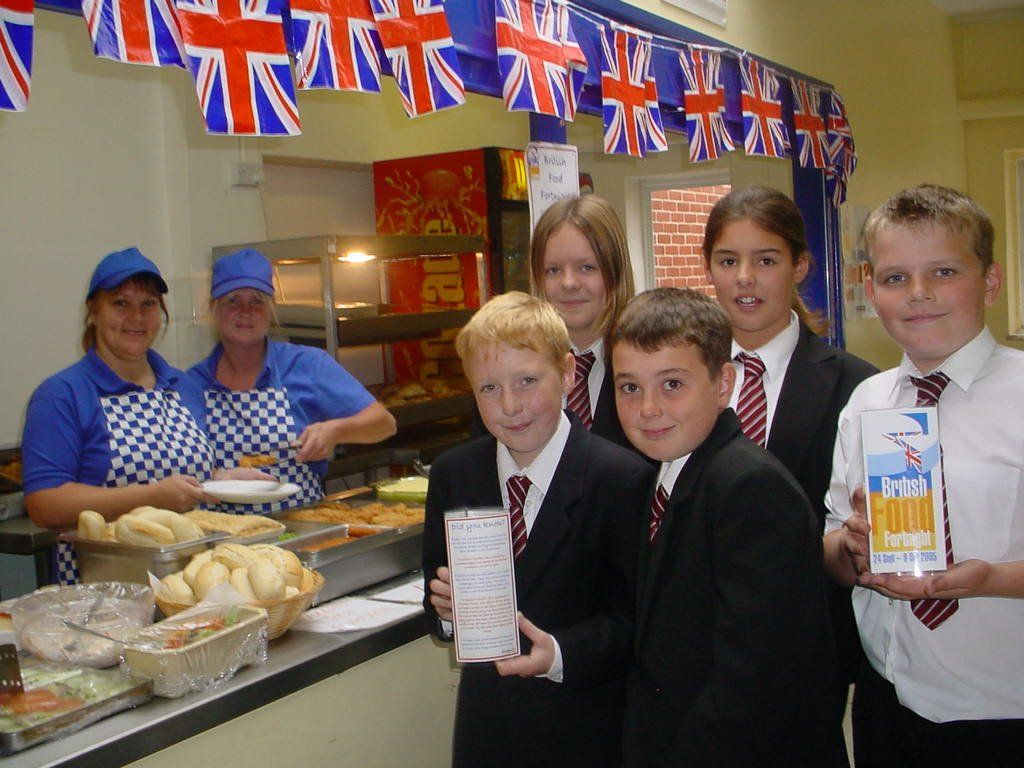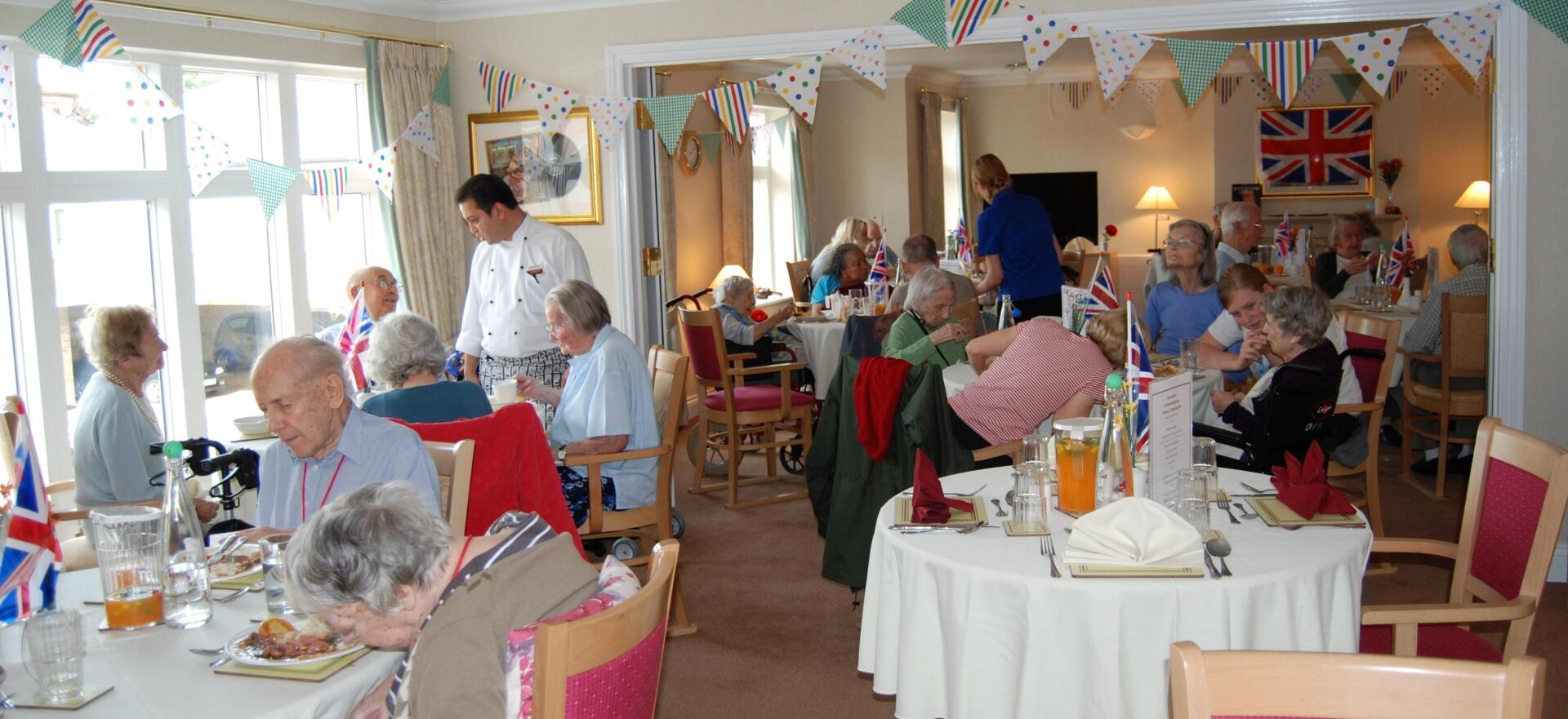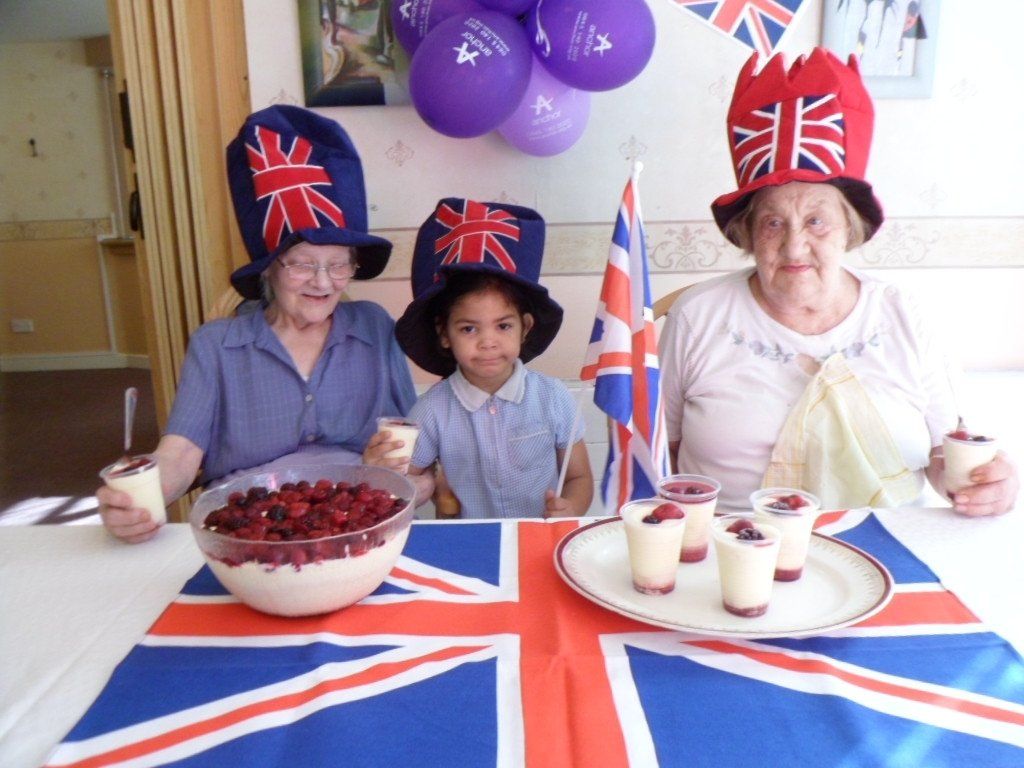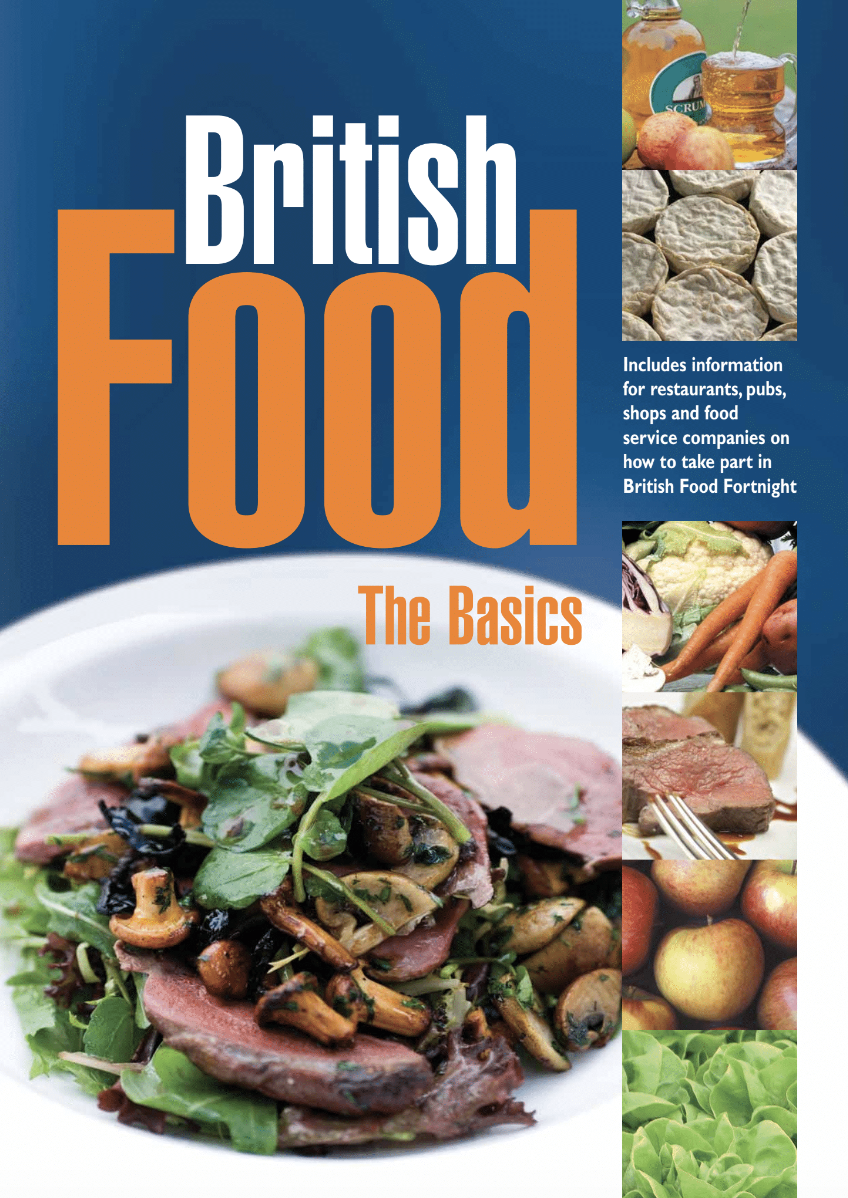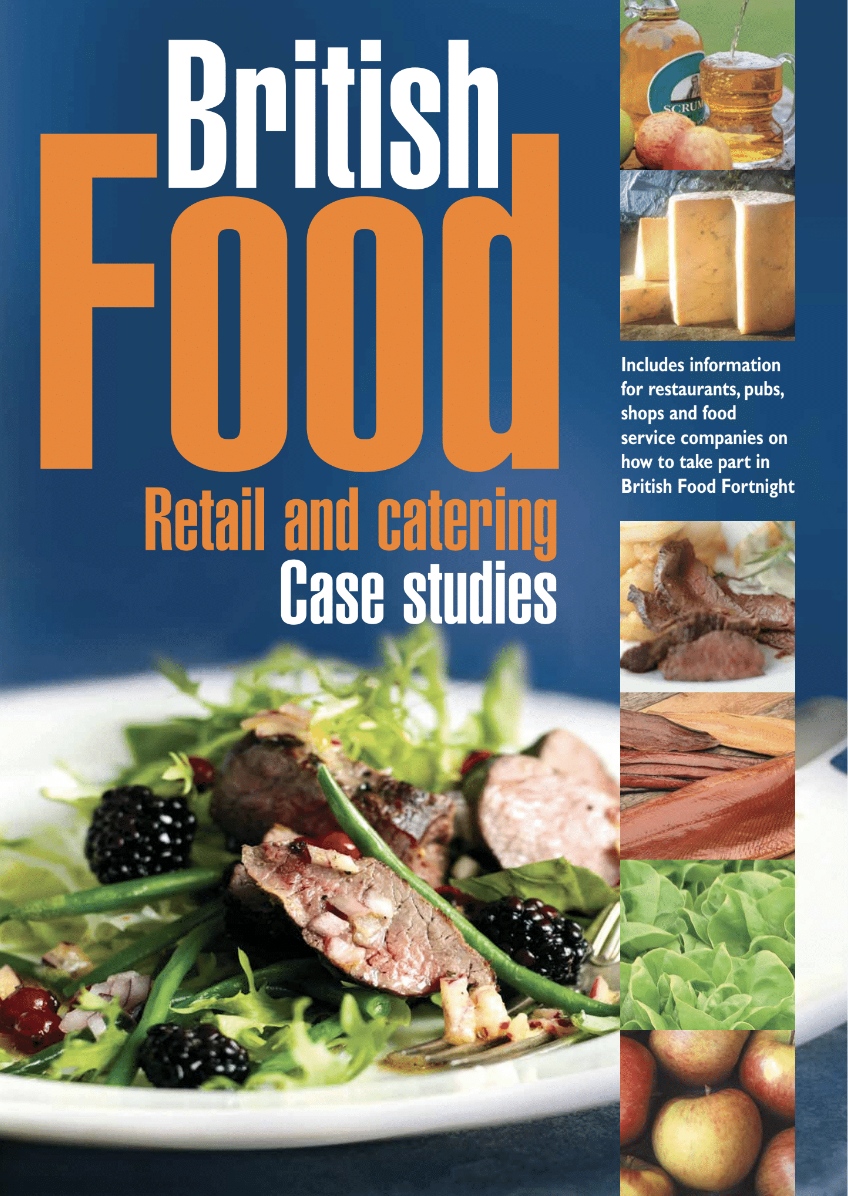Our Work in the Public Sector
Why Take Part?
Love British Food has worked with the public sector since 2004 to encourage the procurement of British food. As we are funded independently by members and partners, our work has not been constrained by state aid rules. We have, therefore, been able to be particularly proactive in working in the public sector promoting a “buy British” message.
We sit on the industry group Public Sector Catering Most Influential PSC100. We are the only food and farming organisation to sit on this group.
We work closely with the following organisations in public sector catering, all of which are Love British Food Stakeholders and many of their leaders are our Ambassadors:
Hospital Caterers Association (HCA)
National Association of Care Catering (NACC)
Local Authority Caterers Association (LACA)
The University Caterers Organisation (TUCO)
We also work with private sector food service organisations that serve the public sector:
Sodexo, Brakes, ISS Food Service UK, Cucina, Harrison Catering, Greenvale AP, Create Food, ESPO and Essential Cuisine. Plus the Craft Guild of Chefs who represent many chefs working in the sector.
All these organisations use the Love British Food platform and branding to encourage local food procurement by their members.
We also work with Welsh Local Government to encourage the procurement of Welsh food by Welsh schools. We have been successful in encouraging 5 Welsh Local Authorities to run Welsh food promotions on school menus.
Love British Food has a monthly editorial feature in the sector’s main trade publication: Public Sector Catering.
We speak at all the major public sector catering national conferences and at many regional ones too.
In the current uncertain times, the public sector needs a robust supply of quality food at stable, affordable prices. With the farmers and producers working ever closer with the food service sector we are already seeing a growing number of public sector sites choosing British as their supplier of choice.
Love British Food’s aim, very simply, is to make British food the first supplier of choice in the public sector. Our message is “if you want a robust supply of quality produce in food service, then British is the best route.”
Here are details of the work we do in the main areas of Public Sector food procurement:
Hospitals
Being part of British Food Fortnight is incredibly rewarding; it is a fantastic campaign that provides everybody within the food and drink industry, plus those with a general interest, to come together and promote the benefits of buying British. It also allows us to network nationally as we identify how we use our wonderful food across the 4 nations. We have an abundance of traditions as well as a wide range of cultures and identifying how we use our products to enhance the flavour, texture and presentation is in our grasp.
Phil Shelley, Head of the Hospital Food Review
Love British Food has worked with the Hospital Caterers Association since 2004 championing the NHS’s role as one of British farming’s biggest customers. The aim has been to showcase those hospitals that are exemplary in their British local sourcing and to encourage others to follow their lead by taking part in British Food Fortnight, the national food celebrations that take place every Autumn.
We have developed a special NHS Love British Food logo for use on hospital menus.
Hospital achievements under the umbrella of the Love British Food campaign have been far-reaching. Working with HCA members, Love British Food has encouraged hospitals to run menu promotions during the national food celebrations, British Food Fortnight, that take place every autumn. Feedback from those taking part has proved that sourcing British translates into sales increases in visitor restaurants, positive customer response from patients and has often been cost-neutral or even saved costs if food was sourced in season.
In March 2018, Love British Food held the first ‘Food Service Sector Summit on British food’ with the HCA as one of the major partners. Leading players from across the industry were invited to a London restaurant that was challenged to serve a delicious British menu within the average per hospital patient meal budget. Phil Howard, Michelin-starred Chef and owner of Elystan Street restaurant was challenged by the Love British Food team to create a British seasonal menu to an average price per head that some hospitals work to - £2.80. It made a powerful point.
Some of the hospitals that have worked with Love British Food are:
- Nottingham University and City Hospitals
- Freeman Hospitals, Newcastle upon Tyne
- Hospital Caterers Association
- Royal Brompton Hospital, London
- Morecambe Bay Trusts Hospital
- Taunton & Somerset Hospital
- Birmingham Women & Childrens Hospital
- Great Ormond Street Hospital
- Cornwall Hospital
- University Hospital of Morecambe Bay NHS
- Newcastle upon Tyne NHS Foundation Trust
- Royal Brompton Hospital, Sheffield
- University Teaching Hospital East Lancs NHS Trust - Blackburn & Burnley and Somerset & Taunton Hospital.
In January 2020, Love British Food organised for the Head of NHS Improvement, Dido Harding, to visit Nottingham University Hospital to see the local food procurement in action there; and to make sure that food was on the agenda of the NHS Improvement programme.
In February 2020, Love British Food led a review of the processes and changes that needed to take place to make it easier for NHS Trusts to source locally. We have produced a series of recommendations, working together with the Chair of the Hospital Food Review, Phil Shelley, and the Chair of PSC100, Andy Jones.
In the summer of 2020, we worked with NHS Supply:Food to launch an initiative to team dairies with their local hospitals. Hospitals buy one pint of milk per patient every day. There is a huge opportunity for more local supply chains between the NHS and the dairy sector.
Case Studies of what has been achieved in some of the hospitals that Love British Food has worked with:
Blackburn Hospital: 750 patients (25,000 meals a week). One of the leaders in hospital catering sourcing British food (where possible) all year including 100% British meat from local suppliers. The team regularly survey patients and visitors to ensure they are fed exactly what people want. British and locally sourced produce is served to patients, visitors and staff. The hospital displays a large map of UK showing visitors and patients where the hospital suppliers are located.
Burnley Hospital: 250 patients (8000 meals a week).
Switching to 100% British (where possible).
Both hospitals will be moving to growing their own fruit,
vegetables and herbs in the future and have now included
British game on their menus 3 times a fortnight.
Both hospitals spend the same budget on British produce as they would on imported goods. Conclusion: Buying British = Cost Neutral
Nottingham City Hospital
Love British Food has worked with them since 2006.
Nottingham City Hospital serves three meals a day to 1,000 bed patients and 100 day patients; it also has a 250 seater restaurant and 5 coffee shops.
In 2006, Nottingham City Hospital set themselves the challenge of sourcing locally for a month over British Food Fortnight while still fulfilling menus that were agreed and printed months in advance. To find suppliers of meat, vegetables and dairy for the promotion:
- Obtained a list of local suppliers from the Hospital Caterers Association www.hospitalcaterers.org and the Agriculture and Horticulture Development Board.
- Sent each of them a copy of the menu and an invitation to pitch for the business. As a result they ended up sourcing from a selection of new and old suppliers.
- As a result, after taking part in British Food Fortnight:
- Relationship with the local dairy has been maintained post the promotion.
- Finalised plans with a butcher so all the meat in the future is from the East Midlands.
- Next step - look for local vegetable suppliers.
How they promoted what they were doing
- New menus mentioned the fact that the hospital runs sustainable menus.
- Newspaper coverage in local Evening Post, Nottingham Post, HCA and Caterer & Hotelkeeper.
- Coverage in the local paper arranged by the new dairy supplier.
What they achieved
- Positive feedback all-round, particularly from patients.
- Sourcing milk locally has been a cost neutral exercise: savings have been made because milk is bought in litres and not pints (yet for the same price) and there is less wastage as the reduced time from ‘teat to table’ means that it has a better shelf-life.
- Entry into Hospital Chef of the Year 2006 was, uniquely, a ‘Sustainability Menu’ and it won the silver medal. Additional press coverage received as a result.
- Improved staff morale as the hospital chefs have enjoyed being challenged mentally in the kitchen.
“They could do what they were doing before blindfolded. This freshens everything up.”
Chris Neale, Soft Facilities Manager, Nottingham University Hospital reports:
- 5,100 meals served a day over two sites – 56 chefs.
- 65% of food used in the hospital is British.
- No cost implication of using British produce year round.
- Relationships with suppliers are key and we know where our ingredients are from.
- Patients order each meal three hours before meal service.
- Runner up British Food Fortnight competition 2017/2018.
“It’s proved cheaper than what we were paying before.”
Perry Lewis, Nottingham City Hospital
Royal Brompton Hospital
Year 1 working with Love British Food
- With 295 beds, 1,600 staff the hospital changed their recipes to use British produce and as much British grown food in the staff restaurant.
- Each day a different food was promoted eg. British sausages, cheese, apples etc.
- Invited local farmers and suppliers to talk to patients and give away free tasters of local Kent produce.
Year 2 working with Love British Food
- Built on activity, focusing on British orchard apples, local bacon and sausages from Hertfordshire, an English cheeseboard and local fruit juices.
Sourcing
- Worked alongside HCA to find local suppliers and also asked local staff and patients.
- Relationships were built with suppliers.
How they promoted activity
- Posters for British Food Fortnight were displayed all over the hospital with the menu
- Staff restaurant was decorated with bunting, Union Jacks and balloons
- Staff were informed on intranet
What they achieved
- Increased the income in the staff restaurant by 12%
- Received significant press coverage – article in Farmers Weekly.
- Improved staff and patient morale.
- Gave people the opportunity to taste different foods they didn’t know were available.
Lessons learnt
- People want to know about local products – they have a historical interest.
- Made aware of the help it gives local economy and environment
Plans for future British Food Fortnight events:
- Plan on taking part in British Food Fortnight again in a major way!
- Try and get all the other NHS Trusts involved in the Fortnight.
- Look to move to source British all year.
Schools
As the National Chair of LACA, The School Food People, I am proud to sit as a Love British Food Ambassador. Our membership are also strong supporters. 80% of school meals served across the country are provided by our members, and we strive to ensure that our ingredients are provided by British farms.
Love British Food’s annual celebration, British Food Fortnight, is a fantastic opportunity to get school children excited about the wonderful food we produce in this country. Hundreds of schools use British Food Fortnight as an opportunity to teach young people about food, and many of our members produce British themed school lunches, with menu cards detailing where the food has been sourced for children to take home to parents.
As the lead voice of the school catering sector, we look forward to continuing to partner with Love British Food to ensure that pupils see healthy eating not just as an option, but a must-have. Locally produced and quality British food has a vital role to play in improving the health of our nation.
Stephen Forster, National Chair of LACA
My son really enjoyed taking part in British Food Fortnight. He has learnt so much about British food and where it comes from. He’s been so enthusiastic coming home and talking about it! It’s been lovely to see British food being promoted and he’s had a great time taking part in the activities at school, especially Breakfast Club. The healthy eating message is so important to us and this fortnight has been a fantastic opportunity to discuss this at home. I hope we can take part in this initiative next year.
Parent at Fochriw School, Wales, Caerphilly Local Authority
Care Homes
“The National Association of Care Catering is always keen to support Love British Food and this year there seem to be yet more reasons to do so. Supporting British growers of such a wide array of foods recognises and appreciates what we have on your own doorstep, an aspect which many of our older community appreciate especially. What better time at the moment as the economy is benefitting from innovation and positivity to help us use what we have right here.
British Food has always been popular within care homes, not least of which due to love of traditional English seasonal dishes on the menus. Through our involvement with Love British Food, care home groups share pockets of inspiration about their ongoing use of British Produce. One care home group worked with a British milk farmer to produce a fortification supplements for residents who may need a nutritional boost, which is now proving really popular as a homemade mousse.
Many care homes plan events during British Food Fortnight including harvest festival celebrations, condiment making, menu food sampling and the ever popular Bake Offs.”
Sophie Murray, NACC
Care home groups working with Love British Food:
Port Haven Care Home Group
CareBase
Broxtowe Borough Council
HC1
Hampshire County Council
Bluebird Care
Brakes care home clients
Sunrise Care Homes
Anchor Care Homes and Hallmark Care Homes
Universities
One thing that will not change is TUCO and its members’ support for Love British Food; whom we have worked with for many years. In these challenging times, it’s never been more important to support our local businesses and British Food Fortnight is a great opportunity to educate young people about healthy, quality produce in a university environment.
Mike Haslin, CEO, TUCO (The University Caterers Organisation)
An estimated 3million+ Love British Food meals are expected to be served in the Public Sector during British Food Fortnight.
Some pointers towards sourcing locally are:
- Contact your existing suppliers to see whether the produce they currently supply you with is British.
- Send current and new suppliers a copy of the menu you would like them to supply British food for and invite them to pitch for the business.
- Don’t be put off by prices that initially may seem higher. Buying large volumes can make the whole process affordable.
- Consider forming a partnership with other public organisations to aggregate demand and make savings through bulk purchase.
- Invest in building long term relationships and trust with suppliers. If you are having problems with a supplier’s ability to deliver on quantity and consistency, for example, take the time to explain your requirements to them and also try and understand the process from their point of view. Seek an affordable compromise for both parties. If fragmented supply is the problem you may wish to consider encouraging suppliers to form a co-operative that better meets your needs.
- Larger suppliers can still provide local produce: be specific when talking to them about what you want and don’t shy away from specifying local products as part of your requirements.
- Do not focus solely on local. This is about good food from across the country, not just on your doorstep.
- Involve your client in the sourcing process. If they are concerned about increased costs explain that healthy eating is a hot topic at the moment and their employees and customers will expect them to respond to this. Good food is a corporate benefit.
- Talk to your suppliers to overcome difficulties that may arise if you are a large caterer trying to work with small suppliers.
- Make sure that the relevant internal structures are in place. Nottingham City Hospital started to source milk from a local dairy. The relationship with the dairy itself worked very well but ensuring that the milk was distributed to the different hospital sites required some internal adjustments.
- If fragmented supply is a problem, encourage producers to form a co-operative that better meets your needs.
- Set up a customer group involving the catering team, suppliers and your clients so that expectations are managed on both sides and problems can be easily resolved.
- Buy in-season products that are often available at competitive prices in order to achieve value for money.
A few examples of the many varied ways that those in the public sector have taken part
Great Ormond Street Hospital joined in promoting Love British Food to patients. The hospital decorated its wards in red, white and blue for the patriotic celebrations.
The Royal Brompton Hospital in London is passionate about seasonal, local British food and takes part in British Food Fortnight every year with menus incorporating British ingredients for patients, staff and visitors. The Royal Brompton Hospital uses the same supplier for vegetables as Clarence House and their sandwich supplier serves Buckingham Palace. All eggs are free range, all milk is organic, and all bacon and sausages are from an Essex Farm.
The Cabinet Office regularly takes part switching all their dishes to British e.g. English bacon not Dutch for British Food Fortnight.
The British Army is another regular participant. They have organised an inter-services field cooking competition during the event; sent chefs into local schools to teach them how to cook; invited pupils to magnificent regimental feasts to mark the national food promotion; and one year held a special curry night York’s Guildhall where the 246 Queens Gurkha Signal Squadron from Nepal, who are stationed at Impham Barracks near York, prepared an authentic Nepalese Gurkha Curry with all the trimmings using local ingredients.
Staff and visitors to Blackpool Victoria Hospital’s restaurant, Oliver’s, and other food areas on the hospital site took advantage of the excellent British food and drink available by offering a special British dish each day throughout British Food Fortnight.
Nottingham City Hospital created 5 dishes to put on sale for British Food Fortnight. Staff and patients got to try dishes like beef in red wine sauce, and lamb pasties. All the meals were taken from a recipe book by Keith Floyd, who was famed for his commitment to fresh British ingredients.
Kent and Sussex Hospital decorated the whole canteen with British Food Fortnight posters and highlight a traditional English meat and dish each day.
British Food: The Basics
Includes information for food service companies on how to take part in British Food Fortnight and advice on sourcing British and local food.
British Food: Retail and Catering Case Studies
This guide includes case studies on public sector establishments (a hospital and a food service organisation) that have used British food on their menus; how they sourced British food; how they promoted it; what results they achieved and lessons learnt.
Hot Tips for maximising sales during British Food Fortnight
A handy guide of tips from those who have taken part.
Don’t miss out!
Sign up to our newsletter and stay up to date with our latest news and events.
The campaign Love British Food, the national food celebrations ‘British Food Fortnight’ and their associated logos are trademarked and must not be used without the express permission of the owners, Love British Food. Companies or individuals wanting to use the logos or run promotions and activity in association with British Food Fortnight or Love British Food can work with Love British Food as a member or partner or with permission from the founder.
Love British Food


